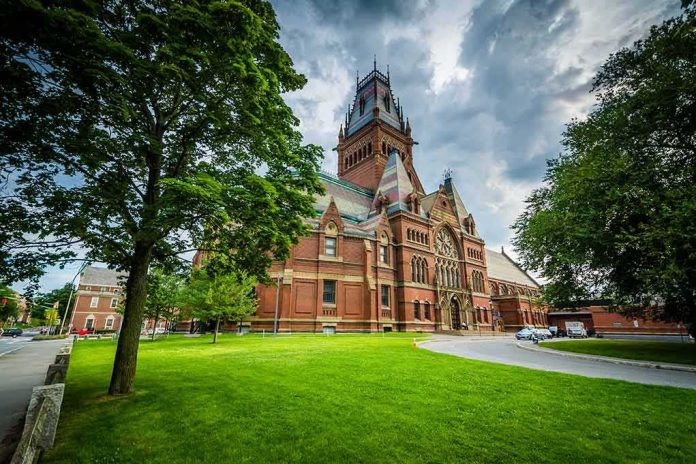
Harvard University, the crown jewel of American academia, now finds itself dangling over the accreditation cliff after the Trump administration issued a damning rebuke of its handling of anti-Semitic incidents—proving yet again that unchecked woke ideology has real-world consequences, even for the so-called elite.
At a Glance
- The Trump administration formally warned that Harvard is at risk of losing its accreditation over failures to address anti-Semitism.
- The Departments of Education and Health and Human Services cited violations of Title VI of the Civil Rights Act.
- Harvard’s accreditor, NECHE, is now under pressure to investigate and potentially revoke Harvard’s status.
- Loss of accreditation could spell disaster for Harvard’s federal funding, reputation, and students’ degrees.
Federal Government Puts Harvard on Notice: Comply or Face Consequences
On July 9, 2025, the U.S. Departments of Education and Health and Human Services delivered a formal notification to the New England Commission of Higher Education (NECHE), Harvard’s accreditor, declaring Harvard in violation of Title VI of the Civil Rights Act. The administration’s message was blunt: Harvard failed to protect Jewish and Israeli students from sustained harassment during and after the Israel–Hamas conflict, ignoring its responsibility to maintain a discrimination-free environment. The government demanded that NECHE either enforce compliance or move to revoke Harvard’s accreditation, a step that would threaten the very existence of the world’s most famous university. Harvard’s initial apology and promises of reform failed to satisfy federal officials, who have pledged “sustained oversight” until the university cleans up its act.
Federal officials, led by Education Secretary Linda McMahon and HHS Secretary Robert F. Kennedy Jr., made it clear that this is not just a slap on the wrist. Secretary McMahon stated Harvard “failed in its obligation to students, educators, and American taxpayers,” while Kennedy Jr. emphasized that oversight would continue until Harvard earns back public trust. The federal agencies moved swiftly after a surge in campus anti-Semitism that coincided with pro-Palestinian protests and a wave of violence and intimidation targeting Jewish students. The administration’s actions follow a similar move against Columbia University in June, signaling a new era of accountability for elite institutions that prefer to hide behind platitudes rather than enforce real standards.
NECHE and Harvard Face a Moment of Reckoning
NECHE, the New England Commission of Higher Education, now holds the fate of Harvard in its hands. NECHE’s board must decide whether to bend under the weight of federal pressure, or actually enforce the rules they claim to uphold. Harvard, for its part, is scrambling to demonstrate compliance, offering apologies and promising reforms after an internal investigation revealed years of neglect on anti-Semitism. But apologies don’t erase the fact that for too long, Harvard’s administration prioritized appeasing loud activist groups over protecting its own students from harassment and discrimination.
The threat is not theoretical. If NECHE finds that Harvard remains out of compliance, it could revoke or suspend the university’s accreditation—a move that would make Harvard students ineligible for federal financial aid, jeopardize billions in research funding, and, frankly, obliterate the value of a Harvard degree overnight. This is what happens when academic elites forget that their ivory towers are built on taxpayer dollars and public trust, not just legacy admissions and donor largesse.
Campus Chaos, Political Pressure, and the Real-World Fallout
The impact extends far beyond Harvard Yard. Jewish and Israeli students have endured hostile campus climates while administrators dithered, worried more about offending loud protestors than protecting victims of hate. The rest of the Harvard community now faces a future clouded by uncertainty—not just over the university’s reputation, but over the practical value of their degrees and the federal funding that keeps the lights on.
This saga is just the latest battleground in a much larger war over the soul of American higher education. Federal agencies are signaling that institutions can no longer hide behind claims of academic freedom or institutional autonomy when they fail to uphold basic civil rights. The precedent is clear: If the feds can go after Harvard, no elite campus is safe from scrutiny. Other universities are already scrambling to tighten anti-discrimination policies, fearful of facing the same public humiliation and existential threats.
Debate Over Federal Overreach and Academic Freedom Intensifies
Legal experts agree the federal government’s use of accreditation as a cudgel is rare, but devastatingly effective. Some civil rights advocates insist this is exactly the kind of robust enforcement Title VI demands—protecting students from discrimination, even if it means taking on the Ivy League. But critics warn that this approach dangerously politicizes higher education, undermining institutional autonomy and academic freedom by turning accreditors into agents of federal policy.
Supporters of the administration’s actions see a long-overdue reckoning for universities that have ducked accountability for years. Detractors call it political theater, accusing the feds of using the cover of civil rights to push their own agenda. What’s not up for debate is the seriousness of the threat: The eyes of the nation are now on NECHE as it decides whether to finally hold Harvard—and by extension, the entire higher education establishment—to account.




